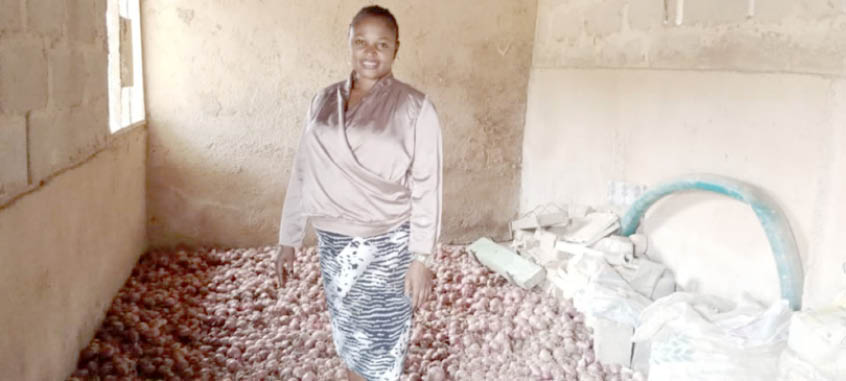Women in Plateau State are dominating the farming space, generating income for their families and supporting their spouses.
With good weather suitable for vegetables and grain production, they take advantage of fertile soil and availability of farmlands in the state to engage in farming.
- NIGERIA DAILY: How Price of Fertilizer will Affect Farming This Season
- Abuja farmer sheds light on rabbit farming in Nigeria
Mrs Atong James, an enterprising woman from Jos North Local Government Area of the state, is changing the narrative and perspective of farming. She owns a farm along the Lamingo area of Jos, the Plateau State capital.
She graduated from the College of Health Technology, Zawan, Jos, in 2006 and works in a hospital.
Despite her tight schedule, she still deploys her energy, expertise, passion and resources into farming.
She has become a source of encouragement to young women, and has been trying to change the perspective of the female folk with respect to farming.
First, she has been an advocate of girls getting themselves engaged in farming rather than sitting idle or waiting on men to support them, which, according to her, often makes them get into wrong relationships or get introduced to antisocial vices or criminality.

Mrs James, 38, and a mother of four, cultivates maize, cassava, onions, tomatoes, Irish potatoes, green pepper, cabbage, groundnut, among other crops and vegetables.
She said she had been farming for about 13 years now and making considerable earnings, adding that she mostly hired others to work for her and paid them between N1,000 and N1,500 daily.
Among those who work for her are energetic farmers who come all the way from Jigawa State in search of jobs during the dry season. Whatever they make during the dry season they return to their state to inject it into their own farms upon the commencement of the rainy season.
She said most of the work was manually done because they could not afford the mechanised system of farming, adding that their major challenge is how to acquire fertiliser to apply on crops for bountiful yield. She is, however, determined to continue with the farm work.
She further said that after her graduation from the school of health in 2006, they farmed for domestic consumption only, but after searching for job for two years without success, she expanded into commercial farming. Even after securing a job, she did not quit farming; hence her exploits.
“We usually go to farm as early as 7am and close between 4pm and 5pm. Even if it is planting season, we don’t usually stay too long in the farm, except we are planting Irish potatoes, which take time because we have to dig the soil to put seeds before applying manure.
“By and large, I thank God for people (young women) who work for me on the farm because they are always committed. And since that is my business now, I have to also be very committed to the work by getting involved and coordinating the activities very well.
“I empower my workers to the best of my ability. And by working for me they are also learning how to farm. Some of them have started their own farms. That is an achievement.
“So, those who work for me benefit in many ways. During harvest, I usually give them a considerable produce to go home with, but some of them will ask for monetary value instead,” she said.
According to her, among the crops she cultivates, maize is easier because she does not usually spend too much money in cultivating it, unlike other crops like Irish potatoes, which seedlings are very expensive. She, however, said it eventually brings more income at the end of the day. After maize, she said, another easier/cheaper crop was onions, adding that she sometimes prioritizes since she does not get support from anywhere.
Mrs James said she had always heard that some farmers get assistance from government establishments/agencies and agriculture-based non-governmental organisations, but did not know how they get it.
She hopes to pursue and get such support as soon as her agribusiness becomes widely known, appreciated and motivational to the female folk, as well as attracts media attention.
On whether she knew anything about the Central Bank of Nigeria (CBN) or Bank of Industry (BOI) agric support, she said she would find out, hoping that they would be friendly to female farmers.
She pointed out her desire in farming was not to compete with anyone but majorly to serve as motivation to women and make them believe in themselves and venture into jobs, businesses and other endeavours usually believed to be exclusive for men.
“I think it is good for the government at all levels to do more in agriculture if they want to fight hunger, create employment opportunities and boost our economy. It is important for the government to deepen its partnership with international communities for agricultural development in the country in order for the country to succeed.
“It is unfortunate, for instance, to still see big and small farmers alike in Nigeria still cultivating and harvesting crops manually. This is unlike in advance countries, and even some developing countries, where machines and magnificent technologies are deployed for farm work.
“Clearing farmlands, making seedbeds, planting seeds, weeding, fertiliser/manure application to plants, harvesting and packaging (where necessary), ought not to have been manually done again in the country. This is given that agriculture is our main occupation and the country is already over ‘61 years old’ now since gaining independence from Britain in October 1, 1960,” she added.

 Join Daily Trust WhatsApp Community For Quick Access To News and Happenings Around You.
Join Daily Trust WhatsApp Community For Quick Access To News and Happenings Around You.


